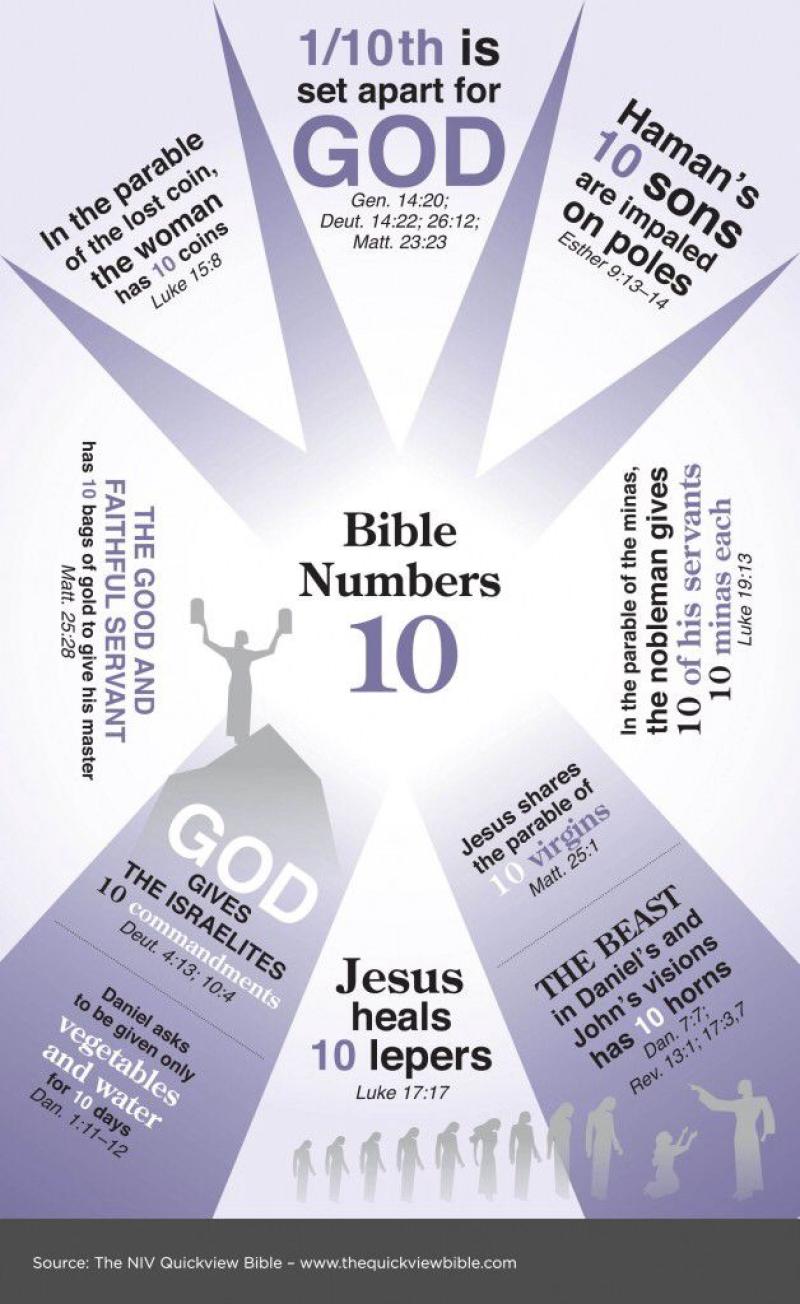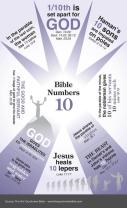What is the importance of numbers in the Bible?
Numbers hold significant symbolism and meaning in the Bible, and they are often used to convey spiritual truths, divine patterns, and symbolic messages. Here are some key examples:
One (1):
- Represents unity and oneness. It signifies the one true God, emphasizing His singularity and supremacy.
Two (2):
- Represents duality, balance, and partnership. It is often associated with the concept of witness or testimony, as seen in the pairing of Old and New Testaments.
Three (3):
- Signifies divine perfection, completeness, and wholeness. It is a number often associated with the Holy Trinity (Father, Son, and Holy Spirit).
Four (4):
- Represents creation, the material world, and the four corners of the earth. It is associated with earthly completeness.
Five (5):
- Symbolizes God's grace and favor. It is also associated with the five senses and the concept of God's goodness.
Six (6):
- Often associated with imperfection and incompleteness. In some biblical passages, it is linked to human labor and fallibility.
Seven (7):
- Represents divine perfection, completeness, and rest. It is a frequently recurring number in the Bible, symbolizing God's work and the culmination of His plan.
Eight (8):
- Symbolizes new beginnings and resurrection. It is associated with the eighth day, representing a new era or a new creation.
Nine (9):
- Represents divine finality and the fullness of spiritual growth. It is often associated with the Holy Spirit's gifts and completeness.
Ten (10):
- Symbolizes completeness and order. It is often used to represent a full measure of something.
Twelve (12):
- Signifies divine authority, governance, and completeness. It is frequently used in the Bible to represent God's chosen people, as seen in the twelve tribes of Israel and the twelve apostles.
Forty (40):
- Represents a period of testing, trial, or probation. It is often associated with periods of preparation and transformation.
Six hundred and sixty-six (666):- Often referred to as the number of the beast, associated with evil and imperfection. It appears in the Book of Revelation.
Seven hundred and seventy-seven (777):- Represents divine perfection and is often associated with God's completeness and holiness.
The significance of numbers in the Bible extends beyond mere mathematical values. Each number carries spiritual meaning and is woven into the narrative to convey deeper truths about God's nature, His plan for humanity, and the spiritual journey. Understanding the symbolic significance of numbers enhances the interpretation of biblical passages and reveals layers of meaning in the text.
The divine language of numbers: The importance of numerical symbolism in the Bible
Numbers are not mere mathematical entities in the Bible; they are imbued with deep spiritual significance and symbolism. Throughout the biblical narrative, numbers serve as a divine language, conveying profound truths and lessons that enrich our understanding of God's character, plan, and relationship with humanity.
Numbers as Symbolic Representations
In the Bible, numbers are often used to represent specific concepts, attributes, or events. For instance, the number seven is associated with perfection, completeness, and divine fulfillment. The number three symbolizes the Trinity, the three-in-one nature of God as Father, Son, and Holy Spirit. The number forty represents a period of testing, preparation, or transformation.
Numerical Patterns and Their Significance
The Bible is replete with numerical patterns that carry symbolic weight. For example, the number four appears repeatedly in the context of creation, signifying the order and harmony God established in the universe. The number twelve, representing the twelve tribes of Israel, symbolizes unity and God's covenant with his people.
Examples of Numerical Symbolism in Biblical Narratives
The use of numerical symbolism is evident throughout the Bible. Consider the following examples:
The Seven Days of Creation: The seven days of creation in Genesis 1 symbolize God's orderly and purposeful act of bringing the universe into existence.
The Ten Commandments: The Ten Commandments, given to Moses on Mount Sinai, represent God's moral law and ethical guidelines for human conduct.
The Forty Years in the Wilderness: The Israelites' forty-year wandering in the wilderness after their exodus from Egypt signifies a period of testing, discipline, and preparation for entering the Promised Land.
The Sevenfold Forgiveness: Jesus' instruction to forgive "seventy times seven" (Matthew 18:22) emphasizes the limitless nature of God's forgiveness and our call to extend forgiveness to others.
Deepening Your Understanding of Biblical Numerology
To delve deeper into the world of biblical numerology, consider these tips:
Study the biblical context: Examine the specific passages where numbers appear, paying attention to the surrounding narrative and the overall message being conveyed.
Consult biblical commentaries and reference books: Utilize resources that explore the symbolic meaning of numbers in the Bible, providing insights and interpretations from various scholars.
Seek guidance from spiritual leaders: Engage with pastors, teachers, or mentors who can provide guidance on understanding numerical symbolism and its significance in the Christian faith.
Embrace personal reflection: As you study biblical numerology, allow yourself to reflect on how these numerical patterns connect with your own faith journey and understanding of God's character and plan.
By approaching biblical numerology with a thoughtful and open mind, you can unlock a deeper appreciation for the richness and complexity of the Bible's message. Numbers, far from being mere digits, serve as a divine language that invites us into a deeper understanding of God's love, wisdom, and plan for humanity.













